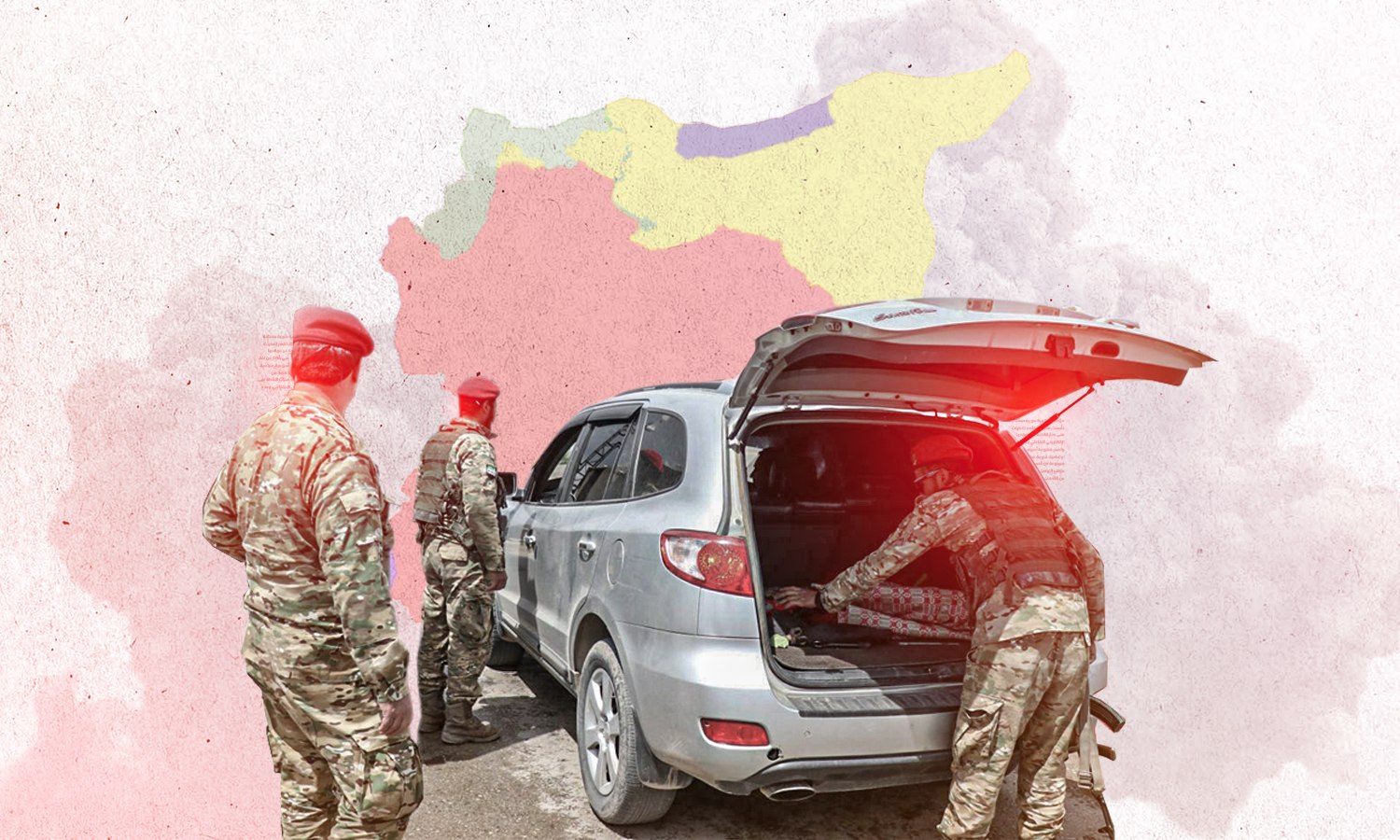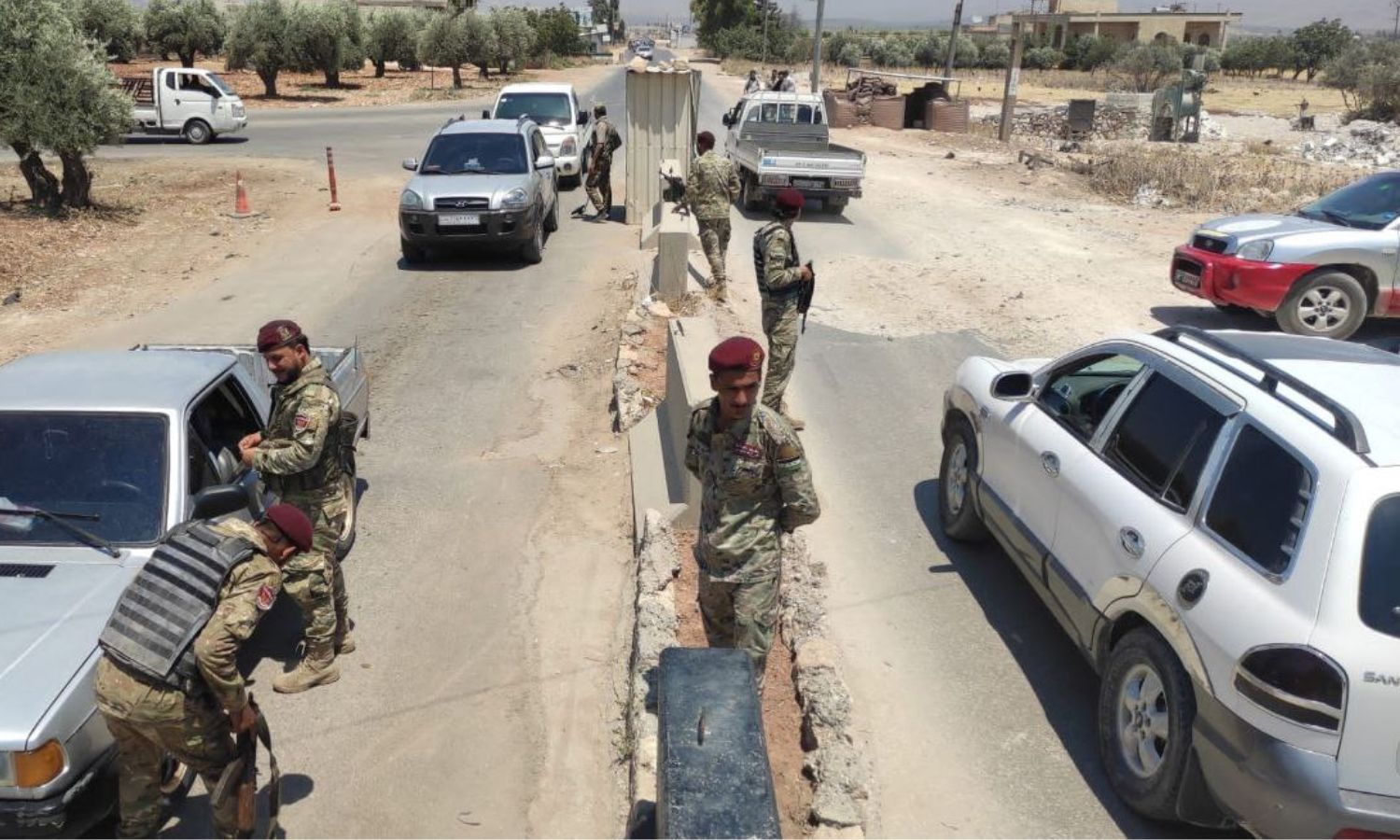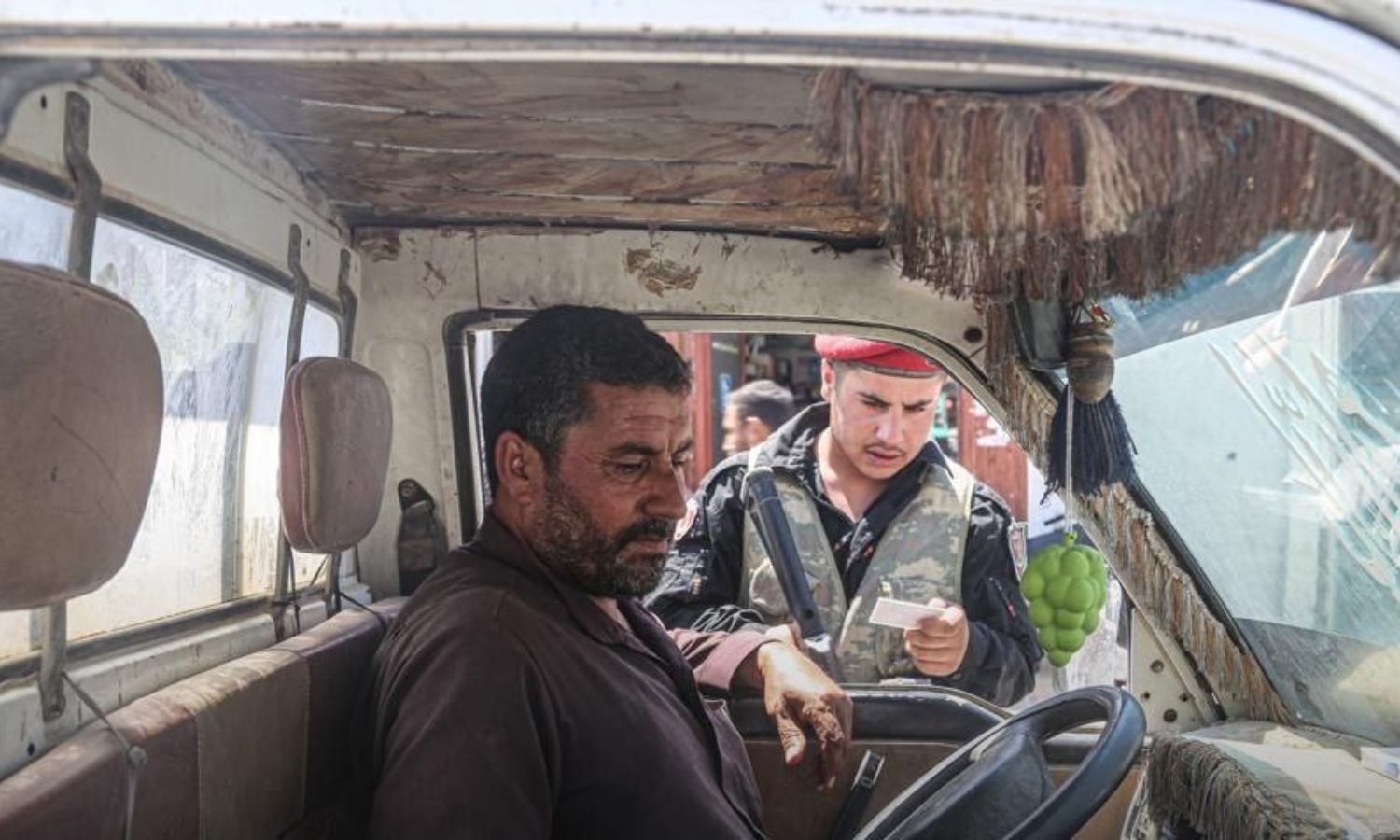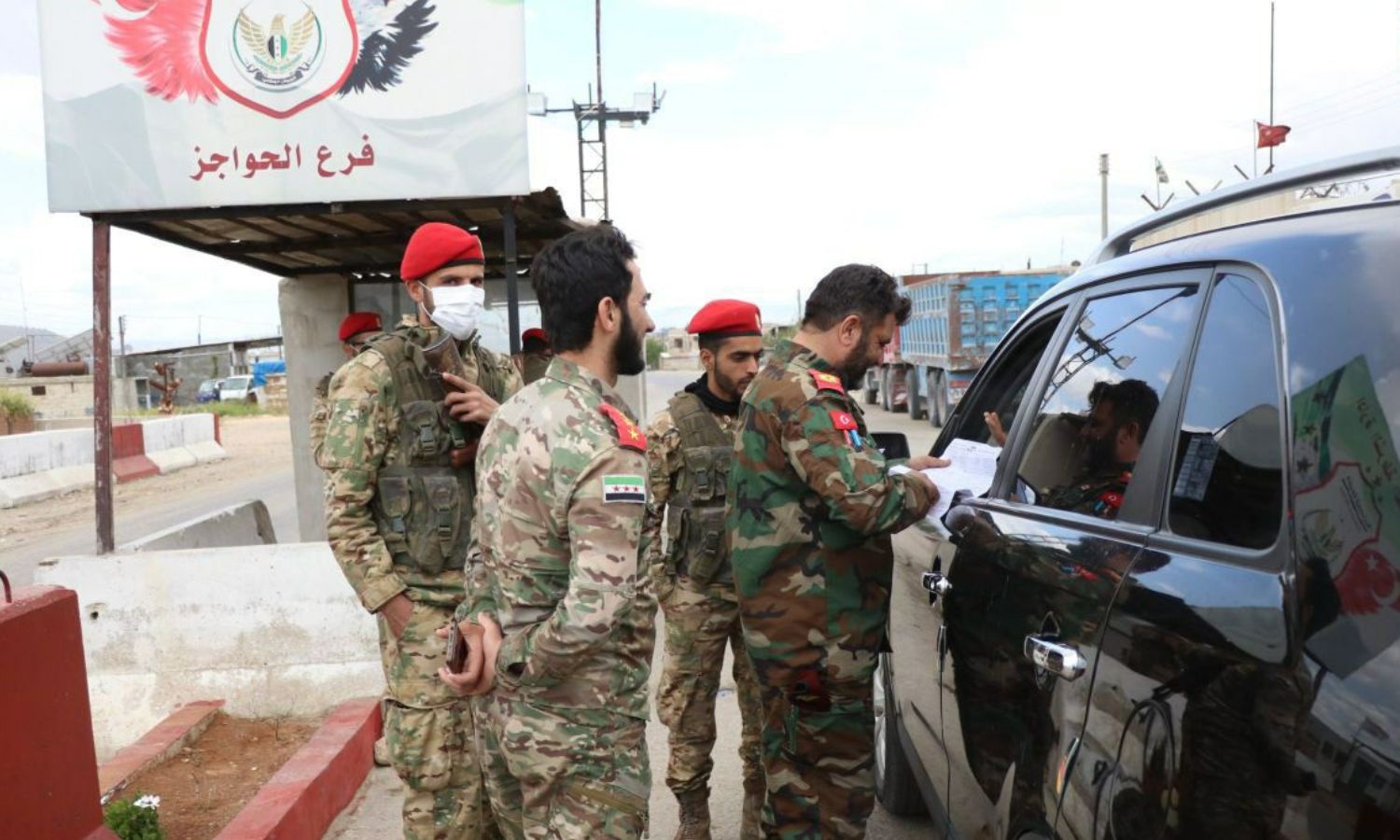



Hassan Ibrahim | Abdul Karim al-Thalji
In a new development in northwest Syria, the Ministry of Defense of the Syrian Interim Government (SIG) has activated military police checkpoints in the al-Ghazawiya area in the western countryside of Aleppo, which borders the areas controlled by the Hayat Tahrir al-Sham (HTS) and its political umbrella, the Syrian Salvation Government (SSG), in Idlib.
Without an official announcement, the checkpoints aim to establish two parallel crossings to the al-Ghazawiya and Deir Ballout crossings operated by Tahrir al-Sham, which separate the latter’s controlled areas in Idlib from the areas controlled by the Syrian National Army (SNA) in the northern and eastern countryside of Aleppo.
Both governments manage their controlled areas economically with systems and decisions that are similar in the part related to economic and trade dealings with the Turkish side but without coordination between them.
The governments differ in their naming of these areas; the Salvation Government considers the “liberated” areas to be those under its control in Idlib, parts of the western countryside of Aleppo, parts of the Latakia countryside, and the al-Ghab plain in northwest Hama.
In contrast, the Interim Government considers the areas of military operations in cooperation with Turkey, namely “Operation Olive Branch,” “Euphrates Shield,” and “Peace Spring,” as the “liberated” areas.
Regarding the purpose of establishing the two crossings, the Minister of Economy and Finance in the Interim Government, Dr. Abdul Hakim al-Masri, said that the military police checkpoints affiliated with the Ministry of Defense will begin the process of vetting goods entering from Idlib to the northern Aleppo countryside, examining whether they are fit for use or not. Goods found to be spoiled will be prohibited from entry.
The minister added to Enab Baladi that the purpose of activating a crossing in the al-Ghazawiya area is to control, analyze, and test goods and that there were materials whose entry had been banned from the crossings toward the Aleppo countryside, such as Turkish frozen chicken, potatoes, and unmarked eggs.
Al-Masri pointed out that some goods that were entering without inspection negatively impacted the people, in addition to complaints from the chambers of industry, commerce, and consumers about the need to impose fees on goods entering from Idlib to northern Aleppo. These concerns were considered, and control of the crossings was implemented accordingly.
Regarding the imposition of fees on goods entering northern Aleppo, al-Masri said that if the opposing side, Hayat Tahrir al-Sham, does not impose fees on goods leaving northern Aleppo to Idlib, then the Interim Government will not impose fees on the goods coming from Idlib to northern Aleppo, emphasizing that the goal is not the fees but the control and analysis of materials.
Al-Masri mentioned that there are specialized employees and experts working at the internal crossings such as Aun al-Dadat (between areas controlled by the Syrian National Army and the Syrian Democratic Forces), alongside a special directorate for the crossings affiliated with the Ministry of Defense in the Interim Government, while the role of the military police is limited to protecting the outlets and maintaining security in the area.

Military police checkpoints affiliated with the Ministry of Defense in the Syrian Interim Government in the Aleppo countryside – June 27, 2023 (Military Police)
A leading figure in the Syrian National Army (SNA), Mustafa Sejari, considered that unifying the internal checkpoints and crossings under the administration and supervision of the military police is a positive state and a necessary step in the framework of internal security control operations, according to what he posted via the “X” platform (formerly Twitter).
He added that the unification of the crossings helps end armed manifestations and remove the security barriers belonging to the military factions by empowering the military police’s management and unifying the internal checkpoints. This is in response to the urgent and necessary demands of the inhabitants of the northern Syrian regions, he said.
Regarding financial resources, Sejari mentioned that National Army fighters were granted a 100% increase in their fixed monthly financial grants, in addition to the financial resources and monthly revenues from the internal and external crossings after unifying the financial fund and handing over the internal crossings to the military police administration.
He added that, for example, the individual share for National Army fighters in January was 3,800 Turkish liras per person, distributed as follows: 2000 Turkish liras for the fighter as a fixed monthly grant, plus 40 US dollars from the external crossings’ share, and 17 dollars from the internal crossings’ share (1 US dollar equals 31 Turkish liras).
In early February, Telegram channels (widely used in the region) circulated news of a 100% increase in the salaries of the fighters within the National Army, making a fighter’s salary 2000 Turkish liras, but there was no official decree on this.
According to most of them, the recent increase in the National Army elements’ salaries was not sufficient to improve their standard of living due to its variability and lack of clarity on the percentage of the raise, the deteriorating economic and living conditions in the region as a whole, and many of them having to resort to various professions to meet their families’ needs.
As Enab Baladi learned from fighters it met, the increase was variable, ranging between 80 and 90%.
The increase from 600 to 1000 liras and from 700 to 1300 liras did not reach the amount mentioned by Sejari, according to three fighters from different corps that Enab Baladi met.
Enab Baladi reached out to the Minister of Defense in the Interim Government to confirm this increase and to clarify the mechanism of granting salaries to fighters but did not receive a response at the time of this report’s preparation.
Two internal border crossings connect the regions: Darat Izza-Al-Ghazawiya, also known as Darat Izza Road, which links the city of Darat Izza in the western countryside of Aleppo with the Afrin region in the eastern countryside of Aleppo.
The second crossing is Deir Ballout-Atmah, connecting the northern countryside of Idlib with the northern and western countryside of Aleppo.
These internal crossings are of high importance regarding the movement of commercial goods and civilians, among other procedures.
The crossings are supervised by forces affiliated with Hayat Tahrir al-Sham and The Public Security Agency operating in Idlib, which denies any connection to them.
Over the past years, Hayat Tahrir al-Sham has prevented the entry of many foodstuffs such as vegetables, fruits, and fuels from areas controlled by the Syrian National Army, on the pretext that those areas were involved in “smuggling and cheating” in the diesel fuel trade, which harmed the overall benefit of the people in the north under the HTS’ control.
Commenting on the opening of the al-Ghazawiya crossing by the Interim Government, researcher and political analyst, Abbas Sharifeh, told Enab Baladi that the new crossing is not a new division in the northwestern region of Syria, since the division already exists, in his words.
Sharifeh added that there are two different military systems, governments, economic and administrative regimes, and that the Interim Government has begun to suffer from the problem of some investors fleeing the Azaz area and its surroundings to Idlib, due to taxes imposed on investors when they market their merchandise in Idlib.
Sharifeh pointed out that the Interim Government is clearly trying to reciprocate, to balance the tax relationship and stabilize investors so they do not consider moving to other areas because of the differential in the taxation issue, noting the necessity of having a unified tax system, as this would negatively affect both the investor and the citizen if taxes are imposed more than once.
The Salvation Government imposes taxes on any goods coming into Idlib from areas under the Interim Government’s control, according to their type and weight, and also conducts thorough inspections of certain materials.
Customs systems define smuggling as the act of illegally bringing goods into or out of the country, or attempting to do so by deceit.
This is done through a state’s territorial borders, which are a means of preserving its wealth and monitoring the movement of goods and people into and out of each country, prompting the government to impose border controls.
In the Syrian case, smuggling occurs, as described by the de facto authorities, across internal administrative borders drawn by the military and political changes in the area.
Researcher and writer Bassam al-Soulaiman told Enab Baladi that the recent decision to establish a crossing in the al-Ghazawiya area, although it has political, military, security dimensions, is covered by “economic dimensions.”
He added that it is known that the customs taxes on the border crossings with Turkey in northern Aleppo are less than at the Bab al-Hawa crossing, which led traders to bring goods through the Bab al-Salama crossing in Azaz and then into Idlib. As a result, the profits of Hayat Tahrir al-Sham from the Bab al-Hawa border crossing with Turkey have decreased.
Al-Soulaiman mentioned that this prompted Hayat Tahrir al-Sham to increase taxes and fees on what comes from north Aleppo to Idlib. For example, the tax on car oil was three US dollars and it became 30 US dollars. Tahrir al-Sham also imposed an analysis process on car oil traders, which made traders revert to importing from the Bab al-Hawa crossing.
At the same time, taxes on goods leaving Idlib for northern Aleppo did not increase, so traders in Idlib became able to compete and sell in northern Aleppo. In contrast, if traders and industrialists from northern Aleppo wanted to market their goods in Idlib, they would be very expensive due to the taxes by Hayat Tahrir al-Sham, according to al-Soulaiman.
This, according to the researcher, led to a significant migration of capital and merchants from northern Aleppo to Idlib, in addition to other reasons related to security. He indicated that traders in northern Aleppo have constant demands on the Interim Government to treat Idlib traders reciprocally by imposing taxes on incoming goods, to enable them to compete in the Idlib market, which is larger than the market in northern Aleppo.

Military police checkpoints affiliated with the Syrian Interim Government in rural Aleppo – June 27, 2023 (Military Police)
The Ministry of Defense of the Syrian Interim Government took practical steps and prepared the parallel crossing to the one controlled by Hayat Tahrir al-Sham in the al-Ghazawiya area. However, it was not confirmed whether the ministry intends to open the crossing in the Deir Ballout area.
With any move by the Interim Government, attention is directed towards Ankara, considering its wide influence in northern Syria, whether military, economic, or service-related, especially in the northern and eastern countryside of Aleppo and, to a lesser extent, in the Idlib areas without direct coordination.
Reading into the step of the crossing, researcher Bassam al-Soulaiman said that it is clear that there is a Turkish orientation to improve the living situation and make reforms in northern Aleppo, in addition to Ankara’s intention to remove Hayat Tahrir al-Sham from areas under the Interim Government’s control, although this is somewhat complex and might not be entirely achieved.
The researcher pointed out that Turkey takes into account any intervention by Tahrir al-Sham, potentially causing disturbances to obstruct this reform. It is not in the interest of the HTS to have a model of governance in northern Aleppo that competes with the governance model in Idlib, especially since it promotes itself as the best model.
Al-Soulaiman believes the crossings, despite their economic importance to traders, carry political, security, economic, and military indications, to prevent disturbances that may arise from Tahrir al-Sham’s intervention, and perhaps an attempt to foil the project agreed upon between Turkey and the Syrian Interim Government.
The researcher added that the newly opened crossing has military objectives to prevent Tahrir al-Sham elements from entering the area, as well as a security goal to reduce the extent of penetrations and security expansion by the HTS in the area, in addition to the economic goal, as there will likely be demarcation and reciprocal treatment in terms of fees, customs, and taxes.
There exists an indirect coordination between Turkey and Tahrir al-Sham, not devoid of disagreements and some thorny issues, such as Turkish sanctions on HTS figures and statements by Tahrir al-Sham leaders that do not align with Ankara’s viewpoint.
The desire of Hayat Tahrir al-Sham to control crossings and areas in rural Aleppo and to expand its areas of influence was reinforced by statements from its leaders and jurists about the need to unify “factions and efforts and to shun division,” especially after the HTS had previously ousted factions and its forces stormed rural Aleppo on previous occasions.

Elements in the Military Police of the Syrian Interim Government at a checkpoint in rural Aleppo – April 30, 2023 (Military Police/Telegram)
The decision to open the border crossing comes a month after the Interim Government held its first investment conference on January 17 in the industrial city of Al-Rai, which lasted four days. It was preceded by media promotion, meetings, sessions, and discussions.
According to Minister Abdul Hakim al-Masri, the conference aimed to economically develop the north and contribute to improving the standard of living and increasing employment opportunities, through five determinants: creating an attractive investment environment, assessing the reality of investment in northern Syria and identifying its requirements.
It also aims to establish incubators for the development of small projects, to stimulate the youth to take the initiative in entrepreneurship, to reach strategic partnerships at both local and international levels in the investment sector, and to create an investment map from the perspective of sustainable development, according to al-Masri.
In turn, Syrian affairs researcher Orabi Orabi considers that the decision to open the two outlets was a result of the recommendations of the investment conference, with the aim of reducing the migration of capital from the areas of rural Aleppo to Idlib, pointing out that the decision itself is part of an economic course adopted by the Interim Government at the beginning of 2024, to attempt the economic uplifting of its affiliated areas.
Orabi does not deny the possibility that the decision has a political dimension related to the Turkish side’s stance on the presence of Hayat Tahrir al-Sham in the Aleppo regions, especially since the Deir Ballout (civil) crossing is used for the movement of civilians, not for goods.
Orabi added, in his talk to Enab Baladi, that this would affect the decline in imports of Hayat Tahrir al-Sham from the movement of goods from Idlib towards the northern countryside of Aleppo, and thus slowing down the work pace in establishing industrial cities in al-Dana and Bab al-Hawa in the northern countryside of Idlib. It also motivates the Interim Government to complete the steps in establishing competitive industrial areas in the northern countryside of Aleppo.
According to Orabi, it is unlikely that Hayat Tahrir al-Sham will react militarily in the near future in case the two outlets are established, especially in light of the current internal crisis represented by the issue of “treason” it is currently going through.
Orabi believes that it is expected that the HTS will take counter-economic measures until the end of its internal crisis, after which other measures might be adopted that may include military and security dimensions.
Hayat Tahrir al-Sham has been experiencing confusion and an internal crisis for about eight months due to accusations against its top leaders of “collaboration” with internal and external parties. This controversy was accompanied by a campaign of arrests and releases, resulting in defections and imprisoning its senior leaders.
Currently, the HTS is trying to contain and end the “treason” issue, but it is facing demands from independent legal scholars and preachers to establish a judicial committee that oversees the case and investigates its details, while casting doubt on what is happening and warning of a graver and more ominous danger.
if you think the article contain wrong information or you have additional details Send Correction